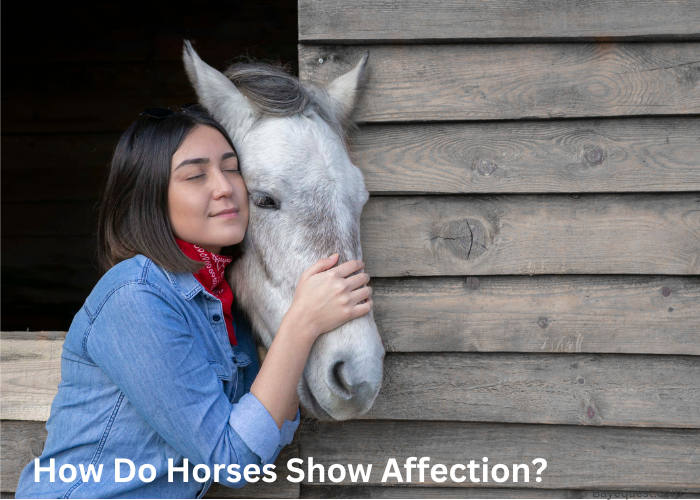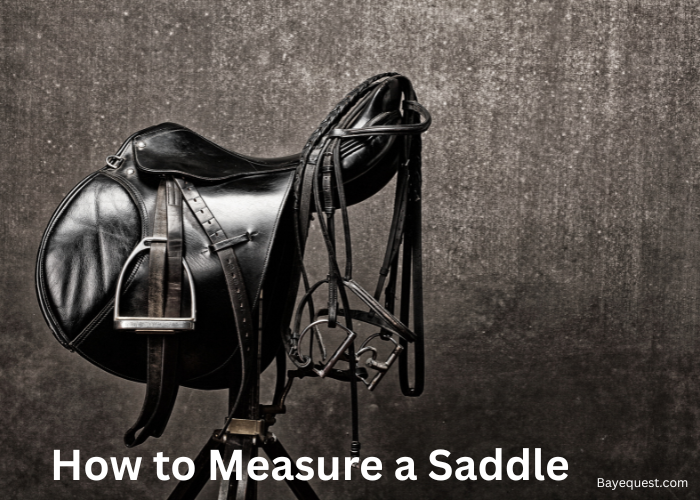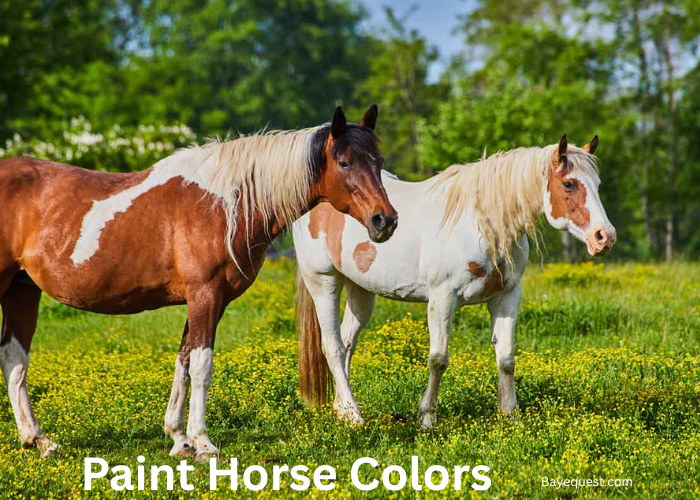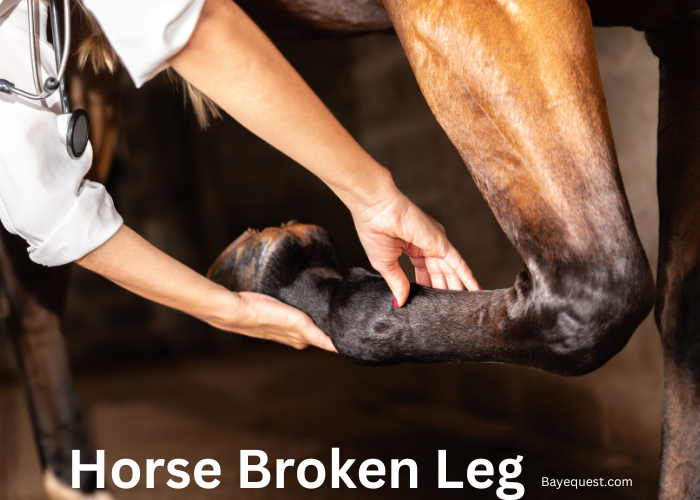Horses have unique and gentle ways of showing affection. They don’t wag their tails or purr, but their gestures are just as touching.
From soft whinnies to tender nudges, horses express love in ways that are all their own.
Ever seen a horse nuzzle your hand or rest its head against you? That’s their way of saying, “I trust you.”
This blog unpacks those special moments, helping you understand how horses communicate their fondness.
Read on for a deeper look into these heartwarming gestures.
How Do Horses Show Affection to Humans? Key Takeaway
Horses show emotions through nuzzling, licking, grooming, and nibling. They nicker, blow, and sigh to express feelings. Standing close, resting their head on you, mimicking actions, and following you are signs of affection. Playful behavior also indicates a happy and comfortable horse.
Do Horses Show Affection?
Yes, horses show affection. They nuzzle and nudge to show they care.
You might feel them lick or nibble gently. They love grooming each other and even you.
Horses nicker softly when happy. They lean close, rest their heads on you, and follow you around.
Playful antics mean they’re comfortable and happy.
11 Ways Horses Show Affection
Now, discover the charming ways horses show affection. The following gestures reveal their love and trust.
1. Nuzzling and nudging
Nuzzling and nudging are gentle gestures that horses use to show affection. They softly press their muzzles against you or nudge you with their nose.
This behavior mirrors how horses interact with each other, conveying a sense of closeness and bonding.
When a horse nuzzles or nudges, it’s their way of saying, “I trust you” and “I enjoy your company.”
It’s a simple yet powerful gesture of connection, showing they feel safe and comfortable around you.
2. Licking
Licking is another affectionate behavior in horses. They might lick your hand, arm, or even your face.
This action is similar to how they would groom another horse. Licking shows trust and a desire to bond.
It’s a sign that they see you as part of their herd. When a horse licks you, they express a deep sense of comfort and familiarity.
It’s a tender gesture that reinforces your bond with them.
3. Grooming behavior
Grooming behavior is common among horses to build and maintain social bonds. When a horse grooms you, it mimics their mutual grooming with their herd mates.
They gently nibble and scratch, usually around your shoulders or back. This behavior shows trust and affection, indicating that they see you as part of their inner circle.
Grooming is their way of showing they care about your well-being and want to strengthen your connection.
4. Nibling
Nibbling is a softer, more playful form of grooming. Horses might use their lips and teeth to nip at you gently.
It’s a light, affectionate gesture that indicates they are comfortable and happy in your presence. Nibbling can be a form of play or a way to get your attention.
When a horse nibbles, it’s a way of engaging with you, showing that it trusts you and enjoys your company.
5. Nickering
Nickering is a soft, throaty sound that horses make when they are content or excited. It’s a friendly greeting often heard when a familiar person or horse is seen.
Nickering shows a positive emotion, like happiness or anticipation.
When your horse nickers at you, it’s a clear sign that they are happy to see you and feel a strong bond with you.
This sound is their way of saying, “Hello, I’m glad you’re here.
6. Blowing and sighing
Blowing and sighing are signs of relaxation and contentment in horses. When a horse blows softly through its nostrils, it’s a sign that they are calm and at ease.
Sighing and taking a deeper breath show that they are releasing tension. These sounds indicate that your horse feels safe and comfortable in your presence.
It’s their way of expressing happiness and relaxation around you.
7. Standing close or leaning in
Standing close or leaning in is a clear sign of affection and trust. Horses are social animals that seek closeness with those they trust.
When they stand close to you or lean their body against you, it shows they feel safe and secure.
This behavior is their way of saying they enjoy being near you and feel protected by your presence.
It’s a simple yet powerful way they show their love and trust.
8. Resting head on you
Resting their head on you is a very intimate gesture from a horse. They might place their head on your shoulder, lap, or chest.
This behavior shows deep trust and affection. It indicates that they feel completely safe and relaxed with you.
When a horse rests its head on you, it’s their way of seeking comfort and expressing their bond with you. It’s a moment of quiet connection that speaks volumes about your relationship.
9. Mimicking actions
Mimicking your actions signifies that your horse is attentive and connected to you.
They might copy your movements, like lifting a leg when you do or following your lead in training exercises.
This behavior shows they are closely attuned to and want to engage with you.
Mimicking actions is their way of showing that they are paying attention and want to be involved in what you’re doing.
It’s a form of communication and connection.
10. Following you around
Following you around is a clear sign of attachment and trust. Horses that follow you are demonstrating their desire to be near you and stay connected.
This behavior shows that they enjoy your company and feel secure with you. When your horse follows you, they say, “I like being with you,” and “I trust you to lead.”
It’s a strong indicator of a positive and affectionate relationship.
11. Being playful
Being playful is a sign of a happy and confident horse. Playful behaviors might include gentle bucking, running around, or engaging in games with you.
When horses are playful, they show they are comfortable, relaxed, and enjoying themselves.
This behavior indicates that they feel safe and happy in your presence.
Playfulness is their way of expressing joy and a strong bond with you. It’s a fun and engaging way they show their affection.
Do Horses Bond With Humans?
Yes, horses bond with humans. They show this through nuzzling, licking, and grooming, just like they do with other horses.
They also nicker softly when they see you and lean close, resting their heads on you.
Horses follow you around and mimic your actions, showing trust and affection.
Playful behavior also indicates a strong bond. These actions all demonstrate their comfort and connection with you.
How to Get a Horse to Like You
Building a bond with a horse is a rewarding journey. To get a horse to like you, you must earn their trust and respect.
Here are some tips to help you connect with your horse and build a lasting, affectionate relationship.
1. Spend quality time
Spend time with your horse regularly. Grooming, feeding, and just being near them helps build trust and familiarity.
The more time you spend together, the stronger your bond will become.
2. Be calm and gentle
Approach your horse with a calm demeanor. Horses are sensitive to your emotions and body language.
Speak softly and move slowly to avoid startling them. Gentle handling fosters trust and makes your horse feel safe.
3. Offer treats wisely
Treats can be a great way to build a positive association. Offer treats as rewards for good behavior.
Avoid overfeeding or using treats to bribe your horse, which can lead to bad habits. (Read more on how to make horse treats at home.)
4. Groom and care for them
Grooming is a bonding activity that horses enjoy. Brush their coat, clean their hooves, and check for any health issues.
This not only keeps them healthy but also strengthens your connection.
5. Learn their language
Understand and respond to your horse’s body language. Notice their ears, eyes, and tail positions.
Respond appropriately to their signals to show that you respect and understand them.
6. Provide consistent training
Consistent and positive training helps build trust and respect. Use gentle, clear commands and reward good behavior.
Consistency helps your horse know what to expect and builds a reliable relationship.
7. Be patient
Building a bond with a horse takes time. Be patient, and don’t rush the process.
Each horse is different, and some may take longer to warm up to you. Patience and persistence are key to gaining their trust.
8. Engage in play
Playful activities can strengthen your bond. Spend time in a paddock or arena engaging in games your horse enjoys.
This can be a fun way to connect and build a positive relationship.
9. Show affection
Show your horse affection through gentle petting and scratching their favorite spots.
Horses enjoy physical touch, and this can help them feel loved and cared for.
10. Respect their space
Respect your horse’s personal space and boundaries. Give them time and space when they need it.
Understanding and respecting their need for space will build mutual trust and respect.
How Horses Show Affection for Other Horses
Horses show affection through simple but meaningful behaviors.
They groom each other by nibbling or scratching, which strengthens their bond.
Close horses often stay side by side while grazing or resting. Playful nipping and gentle chasing are common signs of friendship.
They nuzzle and sniff each other’s faces to show care. Sharing food or water peacefully is another way they express trust.
Bonded horses also protect one another from danger. These actions highlight the deep connections horses form with their companions.
How Horses Show Affection for Other Animal Species
Horses can show affection for other animal species in gentle and unique ways.
They may nuzzle or sniff animals like dogs, cats, or even humans to express curiosity and trust.
Horses often stand close to animals they are comfortable with, showing a sense of calm and companionship.
They can share their space, allowing other animals to graze or rest near them without aggression.
Playful behavior, like gentle nudging or following, is another sign of affection.
Horses may even protect smaller animals they bond with, reflecting their social and nurturing nature.
Do Horses Like Being Hugged?
Horses don’t understand hugs the way humans do, but they can appreciate close, gentle contact.
Some horses might enjoy being wrapped in a gentle embrace if they trust you and feel comfortable.
However, each horse is different. It’s essential to read their body language.
If a horse leans in, nuzzles, or shows signs of relaxation, they might enjoy the hug. Always approach slowly and watch for signs of discomfort, like pinned ears or a tense body.
Respecting their boundaries is key to maintaining their trust and affection.
Read also: Do Horses Like to be Ridden?
FAQs
Are horses affectionate?
Yes, horses are affectionate animals. They form deep bonds with humans and other animals through actions like nuzzling, following, or gently nudging. Their social nature allows them to express trust, love, and care in subtle yet meaningful ways.
What does it mean when a horse smiles at you?
When a horse “smiles,” it’s likely engaging in the Flehmen response. This behavior helps them analyze scents, often associated with curiosity or interest. While it might look like a smile, it’s more about their keen sense of smell than an emotional gesture.
Conclusion
Horses show affection in many sweet ways. They nuzzle, nicker, and groom to express their love.
Standing close, resting their heads on you, and playful actions show they care.
Understanding these gestures helps you bond better with your horse. It’s all about trust and mutual respect. Pay attention to their signals, and respond with kindness.
Your horse’s affection is a sign of a strong, loving connection. Enjoy these moments and cherish the bond you share with your horse.
For more insights on animal behavior and bonding, check out this article on how dogs communicate with their owners.








